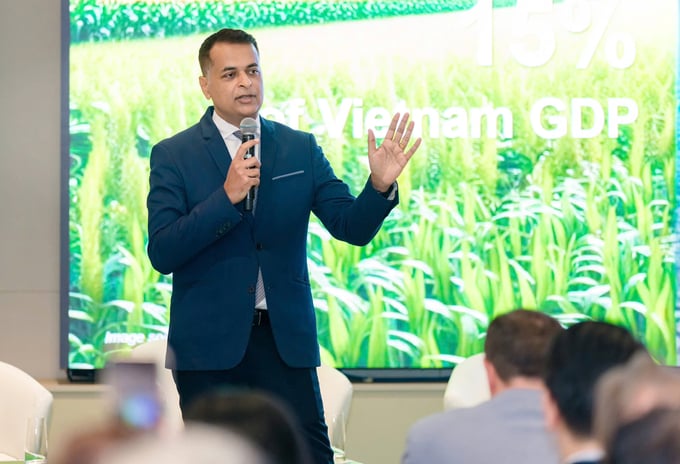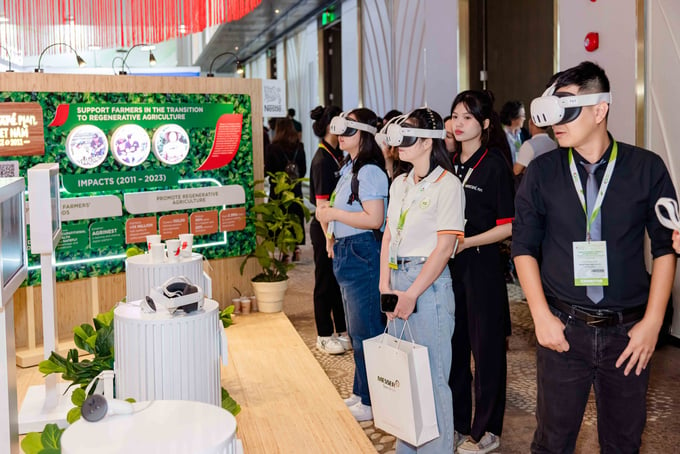November 19, 2025 | 05:11 GMT +7
November 19, 2025 | 05:11 GMT +7
Hotline: 0913.378.918
November 19, 2025 | 05:11 GMT +7
Hotline: 0913.378.918

Binu Jacob, Chairman & Managing Director of Nestlé Vietnam, giving a presentation on regenerative agriculture in coffee production.
During the "Green Economy Forum & Exhibition (GEFE) 2024," co-hosted by the Ministry of Industry and Trade and the European Chamber of Commerce (EuroCham) in Vietnam from September 21 to September 23, 2024, Nestlé Vietnam gave a presentation on the outcomes of its NESCAFÉ Plan program. This initiative has contributed to promoting regenerative food systems, improving farmers' livelihoods, reducing greenhouse gas emissions, and fostering a sustainable green future.
During the session on "Sustainable Food and Agriculture," Binu Jacob, Chairman & Managing Director of Nestlé Vietnam, stated: “The NESCAFÉ Plan is a global initiative by Nestlé aimed at delivering sustainable value to coffee farmers, communities, and the planet.
After 13 years of implementation in Vietnam, the program has achieved multiple positive outcomes by promoting multi-stakeholder cooperation and placing farmers at its center. By guiding farming households in transitioning to regenerative agriculture practices, the program improves the livelihoods of coffee-growing communities, generates positive environmental impacts, and protects biodiversity.
Additionally, Nestlé Vietnam highlighted its collective efforts to enhance the position and value of Vietnamese coffee beans. Over nearly three decades, the Nestlé Tri An plant, one of the most modern facilities within the Nestlé Group, has become a hub for producing the company's coffee products.
Nestlé Vietnam's range of products includes various brands that are familiar to Vietnamese consumers. The company has also exported to 30 countries worldwide, including high-standard, demanding markets such as the United States, Europe, South Korea, and Japan.

Visitors exploring NESCAFÉ Plan farms and the Nestlé Tri An factory through VR 360 technology.
At GEFE 2024, visitors had the opportunity to virtually "tour" NESCAFÉ Plan farms and the Nestlé Tri An factory using VR 360 technology.
With this technology, participants had the opportunity to observe the sustainable coffee farming practices as well as the process of transforming coffee beans into high-value Nestlé Vietnam products, favored by consumers both domestically and internationally.
EuroCham Vietnam's GEFE 2024 was a critical collaborative event that facilitated the exchange of ideas, connections, and collaboration among businesses, government agencies, and non-governmental organizations from Europe and Vietnam. Accordingly, the event was designed to promote greener and more sustainable growth. The topics of the event include sustainable development practices, policies, and initiatives.
Nestlé Vietnam, as Vice President of the Green Growth Sector Committee, played a leading role in steering and coordinating discussions on the circular economy. Several notable topics of discussion include the implementation of extended producer responsibility, design for recycling, and the green vision in the value chain.
Translated by Nguyen Hai Long

(VAN) Integrating agricultural extension activities with ecotourism development unlocks promising new avenues for localities boasting specific advantages in grape and apple cultivation.

(VAN) Enterprises and cooperatives accompany farmers in Tay Ninh to develop an organic seedless lime growing area, paving the way for poverty reduction.

(VAN) There were times when Pho faltered, yet his aspiration to bring the pure aroma to those who truly value clean tea kept urging him forward.

(VAN) Bich Thao Coffee Cooperative pioneered products achieving the national 5-star OCOP standard, paving the way for Son La coffee to conquer international markets.

(VAN) The Bao La bamboo-and-rattan cooperative has been producing goods integrated into value chains. As a result, its products have reached global markets.

(VAN) The training course in An Giang equips learners with emission verification methods, thus creating a basis for low-emission rice production.

(VAN) Thu Lum commune is focusing on developing medicinal plants under the forest canopy, creating sustainable livelihoods for local people, and contributing to protecting the ecological environment.